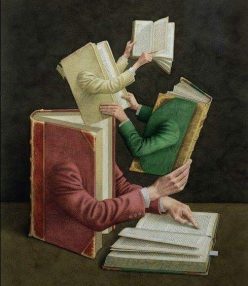![Michiel Horn [portret]](http://www.boekvertalers.nl/weblog/wp-content/uploads/2007/08/michielhorn.jpg) Six years ago, in the course of the CAANS meeting held at Laval University, I appeared in the guise of a novice literary translator. The paper I read then had the title ‘Maarten ’t Hart’s Het woeden der gehele wereld: Problems of translation in a multi-layered novel’. In it I told the story of how I came to translate this fine novel.
Six years ago, in the course of the CAANS meeting held at Laval University, I appeared in the guise of a novice literary translator. The paper I read then had the title ‘Maarten ’t Hart’s Het woeden der gehele wereld: Problems of translation in a multi-layered novel’. In it I told the story of how I came to translate this fine novel.
Introduction to literary translation
To recapitulate: I got the book as a Christmas present in 1998. When I read it a few months later, it impressed me so much that I sought out other works by the author during my next two visits to Holland. My wife, who does not read Dutch but does read German, found a copy of Das Wüten der ganzen Welt (marked Best-seller) in a Munich bookstore, read it at once, and said she thought it was great. In fact, she gave copies of it to a couple of her German relatives. This prompted me to write Maarten, asking him what plans there were for a translation into English.
![Maarten ‘t Hart: Woeden der gehele wereld [omslag]](http://www.boekvertalers.nl/weblog/wp-content/uploads/2007/07/mthartwoedenwereld.jpg) None, he replied, adding that this was no source of regret to him, since he does not like to travel and hates book tours. ‘Too bad,’ I thought. A few months later, in the course of a visit to St. Catharines in order to give a talk on academic freedom at Brock University, I was praising the novel to an old friend, Rob Taylor, who, by virtue of being a historian of modern Germany, could read it in translation. ‘Unfortunately that won’t do much for you, Anne,’ I said, turning to his wife. Rob then suggested that, if the book was as good as I said it was, why didn’t I try translating it? A publisher would be bound to pick it up, and then Anne would be able to read it, too.
None, he replied, adding that this was no source of regret to him, since he does not like to travel and hates book tours. ‘Too bad,’ I thought. A few months later, in the course of a visit to St. Catharines in order to give a talk on academic freedom at Brock University, I was praising the novel to an old friend, Rob Taylor, who, by virtue of being a historian of modern Germany, could read it in translation. ‘Unfortunately that won’t do much for you, Anne,’ I said, turning to his wife. Rob then suggested that, if the book was as good as I said it was, why didn’t I try translating it? A publisher would be bound to pick it up, and then Anne would be able to read it, too.
To work
The challenge set me on my way. I had a sabbatical that year, and for the time being I dropped another project and began the fascinating task of converting one language into another. The process of translation presented significant problems that were essentially new to me, a historian by training and profession. In my 2001 paper I explained how I had tried to resolve them. By Christmas 2000 I had translated seven or eight chapters and sent them to Maarten, saying that if he wished me to stop translating I would. Instead he encouraged me to go on.
By the time I addressed this group in the spring of 2001, my first draft was finished, and I had given it the title God Sought to Kill Moses. It gained Maarten’s approval as well as that of the Nederlands Literair Productie en Vertalingsfonds, the NLPVF. The Arbeiderspers, Maarten’s publisher, accepted the translation and sent it to their agent in London, Laura Susijn. Soon afterwards, while visiting the Netherlands, I met Maarten as well as his editor at the Arbeiderspers, Elik Lettinga. The general mood was upbeat. All that remained, it seemed, was to witness the publication of the translated novel in England, the United States, and other English-speaking markets, and to await the praise for Maarten’s tour de force.
How wrong I was!
*) This is an edited version of a paper read at the annual meeting of the Canadian Association for the advancement of Netherlandic Studies, held at the University of Saskatchewan, Saskatoon, Canada, May 26-27, 2007.
Op woensdag volgt deel twee en vrijdag het slot van Michiels lezing.

Wat leuk – en heel herkenbaar voor mij – dat u uit enthousiasme voor een boek aan het vertalen bent geslagen. Zo ben ik ook ooit begonnen – destijds ook zonder succes, overigens. ‘Het woeden der gehele wereld’ vind ik erg goed, ik pak het geregeld om het te herlezen. Ik hoop dat u een uitgever vindt.